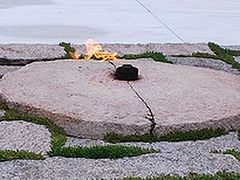In Part 1 of this long article I talked about Marvin Heermeyer, the American welder who gave in to anger and the thirst for revenge and destroyed half of a town with his bulldozer. It was only by a miracle that none of the citizens died, but Marvin’s killdozer became a death machine for himself. He shot himself, without leaving the cabin.
The distorted mirror of anger
In order to enter the fight with anger in your soul, to stop this “killdozer”, you must first of all recognize the danger of this passion. Of course, we are not likely to get into a tractor and start crushing factories and houses. But we can easily destroy our own lives and poison the lives of our close ones by giving in to anger.
How many people have committed murder or came close to doing so while blinded by anger, how many families have broken up and children become orphans with living parents, how many grown children have not seen their own fathers or mothers due to prolonged mutual offense. The devil’s aim is to sow the tares of sin and help a person grow them. Of course his goal is that soul’s death. The apotheosis of the devil’s victory over the person possessed by the passion of anger, melancholy, and despondency is of course, suicide.
I remember a remarkable parable-film by George Nikolaevich Danelia called, “Tears were falling”. At our parish we even held a collective viewing of this motion picture in order to talk afterwards about the theme of struggling with anger. And I would strongly advise anyone who wants to heal his family life ruined by irritation, displeasure, and despondency to watch this old movie.
I will briefly retell the plot of this film. At its foundation is the fairy tale by Hans Christian Andersen, “The Snow Queen”. As we all remember from childhood, it begins as a troll, an evil sorcerer (and in the original text is written that this “was the devil himself”) made a magic mirror in which everything looked distorted, bad, and ugly. At first he just had fun laughing at people, but then his helpers dragged the mirror up to heaven in order to mock the angels and even the Creator Himself. But the mirror fell along the way and shattered, and its shards flew around the whole world. Whenever a piece fell into a person’s eye that person would see people and everyone around him in the worst form, and notice only flaws in everything he sees. But if a piece fell into someone’s heart it would begin to ice over.
One day a piece of this mirror gets into the eye of a man in an ordinary Soviet provincial town, Pavel Ivanovich Vasin (his role was played excellently by Evgeny Leonov). He directs a construction trust; he likes his work and tries to do it honestly and conscientiously. His co-workers appreciate and respect him. He has a family: a wife, son, and granddaughter whom he loves. But now his whole life changes entirely; that is, the people around him don’t change, nor the conditions of his life, but his relationship to them. Everything he sees at home, at work, or on the street starts to irritate him terribly. He sees nothing good, only shortcomings everywhere and in everything. Understandably it becomes very hard for people to be around such a man. First his family leaves him, then he falls out with his friends and co-workers, and then he loses his job altogether due to a conflict with his boss. Driven by anger and constant displeasure to the point of total despair, he wants to leave this life—but in a way that will make his own death a revenge against a person who had greatly insulted him. He writes his suicide note in which he names all the people who are supposedly at fault for his death. After this he makes several attempts to kill himself. But thank God, all his attempts fail. Vasin starts to cry and the shard flies out of his eye, and he once again sees life as it really is.
There is one very important detail in this film. Pavel Ivanovich periodically sees the troll; that is, the devil himself, who laughs at his sufferings.
The moral of this parable is very simple and easy to understand: irritation, anger, and offensiveness not only prevent us from seeing the good in everything and everyone around us, but they can also completely destroy the happiest and more joyful life. The enemy’s aim is to ruin our lives using our own hands, and make it unbearable so that finally our soul is lost.
The first thing
Where should we begin in our struggle with anger? With hatred of it. St. Theophan the Recluse says, “At first we must rebel against sin by completely hating it, kicking it out of its main place of residence by breaking its will, arousing a thirst for opposing sin, and submitting ourselves to God’s holy will, and then we must rise up against even the beginnings of this sin and strike whatever is left of it in ourselves until it is completely exhausted in us.”
We should recognize this passion as the enemy, who has audaciously invaded our lives and is intentionally destroying it; recognize that we are not controlling our life and building it as we want, but our passion is building it for us. We want not to get angry, not to be irritated, not to lash out at people around us; we want to see the good in people, but it doesn’t work—our passion has made slaves of us. When we understand that we are not controlling our passions but our passions are controlling us and enslaving us; when we want to become free of their influence and then make a firm decision to conduct merciless war with our inner enemy and enslaver, from that moment we step on the path of healing. The struggle with anger is very serious work, requiring patience and time. We have to want to struggle with it very much. For this we have to recognize the total destructiveness of this passion.
After admitting our own weakness and powerlessness the second step is fervent prayer to God for help. This prayer should be made regularly (daily) with faith, hope, and humility before the Lord. It is very good to unite at the end of our morning prayers a request of God to give us the strength to war with anger and irritability, to help us see the good in events of the day and people around us, and to avoid judgment, irritation, and offensiveness. In general, if we have a special request of the Lord we need to continually keep in it our soul throughout the day, and remember it whenever we have a moment—during services in the church, passing by a church, and simply whenever there is a free moment. It is also good to take on ourselves some particular prayer rule, to read for example a canon or an Akathist to the Lord or the Mother of God. You yourself can choose which—the main thing is that the prayer be heartfelt.
Hating the passion
Let’s return to hating the passion. Of course, intellectually we understand the destructiveness of sinful dependence and harmful habits. But how can we hate what has given us pleasure for so many years, and with which very pleasant experiences are connected? Yes, strange as it seems, even such unpleasant thing as anger can be very pleasurable to some. This passion brings the person who is given to it even a purely physiological pleasure. At the moment of anger adrenalin is poured into the bloodstream, and as we know, this hormone stimulates many pleasant sensations. Adrenalin dare-devils are even called adrenalin addicts. The angry person is just such an adrenalin addict. True, after an explosion of anger one usually feels very bad, ashamed—after all, everyone has a conscience—but that is “later”. Anger also creates a temporary sensation or illusion of power over people, of strength. This is also very pleasant to the angry person. That is, anger has, as they say, its pleasant bonuses. That means that we have to know how to see the whole negative side of this passion, its complete unpleasant and destructive essence. For this several methods exist.
In order to understand all this passion’s ugliness, it is very important to as if look at ourselves and our passion from the outside. After all, we don’t very well imagine what an indecent, repulsive appearance we present when we give ourselves over to anger. There is one piece of advice: When you are angry, offended, or irritated take a look in the mirror (this especially works for women), and you will see not your customarily nice face but some sort of demonic mask. That is what people around you have to look at during your moment of irritation. I remember the story of one woman whose neighbor helped her look at herself objectively during family quarrels. One day the neighbor met this lady and asked her whether she knew which of their neighbors it was who screams so horrifically at her family and constantly quarrels with them? Maybe they need to take some measures? This woman felt so ashamed; she was the one who was causing these domestic scandals, but her neighbor didn’t guess it, because she had always known her as an outwardly calm and well-mannered woman. After this lesson she started watching herself, and the domestic battles ceased.
It is very important with the passion of anger to have frequent confession. Besides repentance of the sin and getting strength from the sacrament, there is one important thing here: When you tell you confessor about things that are unpleasant to you, like arguments, scandals, and emotional eruptions, you begin to feel ashamed that you are repeating these sins, and receive additional motivation for the struggle with anger. When you tell about these unpleasant situations you become particularly ashamed of your unrestrained behavior, and the sin you committed stands before you in all its ugliness.
Another piece of advice. They say that when you really want to give free reign to anger, to say something insulting, or raise your voice to a shout, in that moment you should create an unpleasant sensation in place of the pleasant sensations that come with anger. Go right into the kitchen and eat a spoonful of salt or chew a lemon. Do this every time. After a while you will associate your anger with very unpleasant, distasteful sensations. This will help you stop it in time. In general, as soon as an angry thought or desire approaches, you need to imagine and remember the terrible consequences that usually come after an explosion, and all the harm that your anger brings to people.
“Before it’s too late for us to make a pause…”
But in order to apply all these methods, we have to learn one simply indispensible thing—to make a pause, to stop, as they say, “look back in anger.” This is for the short-tempered, irascible person extremely difficult. Any sin begins with a sinful thought. This is already a certain concept, idea, or project of sin. Yet one more step and the sin is embodied in action. This is what St. Ignatius (Brianchaninov) writes: “Usually people consider sin as something of little importance, because they are very indiscriminate in their acceptance of thoughts. From the acceptance of correct thoughts is born everything good, but from the acceptance of false thoughts is born everything evil. Thought is like the ship’s wheel—upon this small wheel and an insignificant board hanging behind the ship depends the course and to a great extent the fate of the whole enormous machine.” Thus, we need to learn to struggle with thoughts, to learn to cut them off at the very beginning, when they are just approaching the soul. There are many patristic works dedicated to this art; this theme is quite broad, and the size of this article does not allow us to discuss it in detail. But I think that each of us can acquaint ourselves with it independently.
Cutting off sinful, angry thoughts, not conversing with them but expelling them and switching to others means precisely “making a pause.” When anger attacks, you need to do anything you want but do not give in to it, for later it can easily get out of control. Like a fire that gets harder to extinguish the longer burns, like the bursting of a dam that is very hard to stop. When the desire arises to get angry, to say something abrupt or sharp, we have to start praying, saying for example the Jesus prayer. Go into another room and read the Gospel, the Psalter. If you don’t have the strength for this, start cleaning or washing the dishes, doing any simple work. The anger can be transferred to physical activity. Quickly don your sweat suit and start running. After running a mile, I assure you that your desire for anger will most likely go away. And in general it is well known that if you don’t give in to anger, if you pause in time, the eruption and insurmountable desire to give free reign to emotions will pass, and the subject of conflict will most often no longer look so important. But the most important thing is to learn to make that pause in time.
When there is no possibility or time for a long pause, you have to at least briefly sigh in prayer, “Lord, help me,” and also take a few deep breaths, holding the last breath. Breathing exercises help us to calm down.
If you were able to make at least a short pause, at that moment you need to imagine and weigh what will come next if you give in to your feelings and allow anger. Remember what usually happens afterwards. What do we gain (not much) and what do we lose (peace of soul and peace with our neighbor, their good relationship to us, and disorder, emptiness, and shame reigning in the soul). The principle of weighing is a very useful rule of life. After all, we are constantly placed before a choice of what is most importance to us, and what is secondary or insignificant; what is necessary and useful, and what is completely unnecessary even harmful, and so on.
When wolves go after a herd of animals, they first of all attack the weak, hungered, or sick animals. The demons of anger and irritation likewise tempt us most often when we are hungry or tired. This especially applies to men. A smart wife will never assail her husband with requests and problems when the husband has arrived home from work hungry and tired. She will first feed him and let him rest. I can advise men (and this advise could come in handy for women also). When you are approaching your house after a workday, don’t be hasty about entering. Sit a little in the car, open the window, listen to music. If you’re not in a car then sit on a bench outside the building, or even better, walk around the block. Then your meeting with your loved ones will go much more peacefully, even if they give you cause for irritation.
To be continued.






